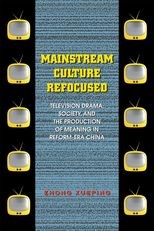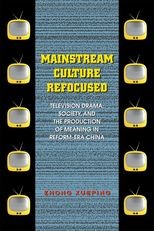Mainstream Culture Refocused: Television Drama, Society, and the Production of Meaning in Reform-Era China
Mainstream Culture Refocused: Television Drama, Society, and the Production of Meaning in Reform-Era China
Cite
Abstract
Serialized television drama dianshiju, perhaps the most popular and influential cultural form in China over the past three decades, offers a wide and penetrating look at the tensions and contradictions of the post-revolutionary and pro-market period. This book draws attention to the multiple cultural and historical legacies that coexist and challenge each other within this dominant form of storytelling. This book argues for recognizing the complexity of dianshiju’s melodramatic mode and its various subgenres, in effect “refocusing” mainstream Chinese culture. The book opens with an examination of television as a narrative motif in three contemporary Chinese art-house films. It then turns attention to dianshiju’s most important subgenres. “Emperor dramas” highlight the link between popular culture’s obsession with emperors and modern Chinese intellectuals’ preoccupation with issues of history and tradition and how they relate to modernity. In an exploration of the “anti-corruption” subgenre, the book considers three representative dramas, exploring their diverse plots and emphases. “Youth dramas’” rich array of representations reveal the numerous social, economic, cultural, and ideological issues surrounding the notion of youth and its changing meanings. The chapter on “family-marriage” analyzes the ways in which women’s emotions are represented in relation to their desire for “happiness.” Song lyrics from music composed for television dramas are considered as “popular poetics.” The Epilogue returns to the relationship between intellectuals and the production of mainstream cultural meaning in the context of China’s post-revolutionary social, economic, and cultural transformation.
-
Front Matter
-
Introduction
Mainstream Culture Refocused: Toward an Understanding of Chinese Television Drama
-
One
Looking through the Negatives: Filmic-Televisual Intertextuality and Ideological Renegotiations
-
Two
Re-collecting “History” on Television: “Emperor Dramas,” National Identity, and the Question of Historical Consciousness
-
Three
In Whose Name? “Anticorruption Dramas” and Their Ideological Implications
-
Four
Beyond Romance: “Youth Drama,” Social Change, and the Postrevolution Search for Idealism
-
Five
Also beyond Romance: Women, Desire, and the Ideology of Happiness in “Family-Marriage Drama”
-
Six
Listening to Popular Poetics: Watching Songs Composed for Television Dramas
- Epilogue: Intellectuals, Mainstream Culture, and Social Transformation
-
End Matter
Sign in
Personal account
- Sign in with email/username & password
- Get email alerts
- Save searches
- Purchase content
- Activate your purchase/trial code
Institutional access
-
Sign in through your institution
- Sign in with a library card Sign in with username/password Recommend to your librarian
Institutional account management
Sign in as administratorPurchase
Our books are available by subscription or purchase to libraries and institutions.
Purchasing information| Month: | Total Views: |
|---|---|
| October 2022 | 2 |
| October 2022 | 6 |
| October 2022 | 2 |
| October 2022 | 1 |
| October 2022 | 49 |
| October 2022 | 8 |
| November 2022 | 14 |
| November 2022 | 2 |
| November 2022 | 10 |
| November 2022 | 2 |
| November 2022 | 2 |
| November 2022 | 2 |
| November 2022 | 2 |
| November 2022 | 9 |
| December 2022 | 5 |
| December 2022 | 1 |
| December 2022 | 1 |
| December 2022 | 21 |
| December 2022 | 1 |
| December 2022 | 4 |
| December 2022 | 2 |
| January 2023 | 1 |
| January 2023 | 4 |
| January 2023 | 4 |
| January 2023 | 2 |
| January 2023 | 18 |
| January 2023 | 1 |
| January 2023 | 6 |
| January 2023 | 4 |
| January 2023 | 1 |
| February 2023 | 2 |
| February 2023 | 1 |
| February 2023 | 3 |
| February 2023 | 4 |
| February 2023 | 1 |
| February 2023 | 1 |
| February 2023 | 1 |
| February 2023 | 24 |
| February 2023 | 2 |
| February 2023 | 7 |
| February 2023 | 1 |
| February 2023 | 1 |
| March 2023 | 5 |
| March 2023 | 10 |
| March 2023 | 26 |
| March 2023 | 4 |
| March 2023 | 1 |
| April 2023 | 2 |
| April 2023 | 14 |
| April 2023 | 1 |
| April 2023 | 6 |
| April 2023 | 2 |
| April 2023 | 1 |
| May 2023 | 8 |
| May 2023 | 15 |
| May 2023 | 3 |
| June 2023 | 3 |
| June 2023 | 2 |
| June 2023 | 21 |
| June 2023 | 2 |
| June 2023 | 3 |
| June 2023 | 2 |
| July 2023 | 3 |
| July 2023 | 3 |
| July 2023 | 2 |
| July 2023 | 2 |
| July 2023 | 2 |
| July 2023 | 4 |
| July 2023 | 2 |
| July 2023 | 2 |
| July 2023 | 4 |
| July 2023 | 2 |
| July 2023 | 2 |
| July 2023 | 2 |
| July 2023 | 2 |
| July 2023 | 2 |
| July 2023 | 2 |
| July 2023 | 2 |
| July 2023 | 3 |
| July 2023 | 2 |
| August 2023 | 3 |
| August 2023 | 1 |
| August 2023 | 5 |
| August 2023 | 6 |
| August 2023 | 5 |
| August 2023 | 1 |
| August 2023 | 1 |
| August 2023 | 1 |
| September 2023 | 7 |
| September 2023 | 1 |
| September 2023 | 3 |
| September 2023 | 3 |
| October 2023 | 4 |
| October 2023 | 7 |
| October 2023 | 1 |
| October 2023 | 5 |
| October 2023 | 6 |
| October 2023 | 5 |
| November 2023 | 3 |
| November 2023 | 10 |
| November 2023 | 1 |
| November 2023 | 5 |
| November 2023 | 2 |
| November 2023 | 4 |
| November 2023 | 1 |
| December 2023 | 1 |
| December 2023 | 5 |
| December 2023 | 5 |
| December 2023 | 1 |
| December 2023 | 3 |
| December 2023 | 6 |
| January 2024 | 2 |
| January 2024 | 6 |
| January 2024 | 3 |
| January 2024 | 6 |
| January 2024 | 1 |
| January 2024 | 3 |
| January 2024 | 4 |
| January 2024 | 1 |
| January 2024 | 2 |
| January 2024 | 4 |
| January 2024 | 3 |
| January 2024 | 1 |
| January 2024 | 5 |
| January 2024 | 5 |
| January 2024 | 3 |
| January 2024 | 2 |
| February 2024 | 3 |
| February 2024 | 1 |
| February 2024 | 1 |
| February 2024 | 1 |
| February 2024 | 2 |
| February 2024 | 1 |
| February 2024 | 3 |
| February 2024 | 11 |
| February 2024 | 2 |
| February 2024 | 1 |
| February 2024 | 1 |
| February 2024 | 7 |
| March 2024 | 1 |
| March 2024 | 6 |
| March 2024 | 7 |
| March 2024 | 2 |
| March 2024 | 8 |
| March 2024 | 1 |
| March 2024 | 1 |
| March 2024 | 5 |
| April 2024 | 1 |
| April 2024 | 2 |
| April 2024 | 1 |
| April 2024 | 1 |
| April 2024 | 2 |
| April 2024 | 3 |




Get help with access
Institutional access
Access to content on Oxford Academic is often provided through institutional subscriptions and purchases. If you are a member of an institution with an active account, you may be able to access content in one of the following ways:
IP based access
Typically, access is provided across an institutional network to a range of IP addresses. This authentication occurs automatically, and it is not possible to sign out of an IP authenticated account.
Sign in through your institution
Choose this option to get remote access when outside your institution. Shibboleth/Open Athens technology is used to provide single sign-on between your institution’s website and Oxford Academic.
If your institution is not listed or you cannot sign in to your institution’s website, please contact your librarian or administrator.
Sign in with a library card
Enter your library card number to sign in. If you cannot sign in, please contact your librarian.
Society Members
Society member access to a journal is achieved in one of the following ways:
Sign in through society site
Many societies offer single sign-on between the society website and Oxford Academic. If you see ‘Sign in through society site’ in the sign in pane within a journal:
If you do not have a society account or have forgotten your username or password, please contact your society.
Sign in using a personal account
Some societies use Oxford Academic personal accounts to provide access to their members. See below.
Personal account
A personal account can be used to get email alerts, save searches, purchase content, and activate subscriptions.
Some societies use Oxford Academic personal accounts to provide access to their members.
Viewing your signed in accounts
Click the account icon in the top right to:
Signed in but can't access content
Oxford Academic is home to a wide variety of products. The institutional subscription may not cover the content that you are trying to access. If you believe you should have access to that content, please contact your librarian.
Institutional account management
For librarians and administrators, your personal account also provides access to institutional account management. Here you will find options to view and activate subscriptions, manage institutional settings and access options, access usage statistics, and more.